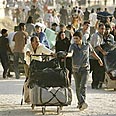
The Rafah border crossing was reopened on Friday , allowing thousands of Palestinians who have been stranded on the Egyptian side of the Gaza-Egypt border for over two months o cross into the Strip.
European observers in charge of operating the crossing returned on Friday morning. The crossing was closed on June 25, the day Corporal Gilad Shalit was kidnapped near Gaza.
It remains unclear for how long the crossing will be open but European and Palestinian officials will meet to discuss the matter.
Palestinian gunmen have been randomly detonating explosives near a wall separating Gaza from Egypt in a bid to pressure Israel to open the crossing.
On Thursday gunmen blew up a small section of the wall and threatened to wage more attacks if the crossing is not opened soon.
Rafah is Gaza’s main gateway to the outside world. Under a US-brokered agreement, Israel turned over control of the border to the Palestinians after withdrawing from Gaza last year.
To ease Israeli security concerns, the Palestinian side of the crossing is monitored by a team from the European Union, while Israeli authorities observe the crossing with video cameras.
Israel has frequently issued security alerts in the area, keeping monitors from reaching the crossing and preventing it from opening. One such alert was issued shortly before the soldier was abducted in June.
On Thursday the Director of Operations of the UN Relief and Works Agency in Gaza, John Ging, described the overall humanitarian living conditions in Gaza, as "miserable, frustrating and still deteriorating."
He warned that his agency's humanitarian work in Gaza is grinding to a halt because of lack of access in and out of Gaza, the Palestinian news agency WAFA reported.
AP contributed to this report















